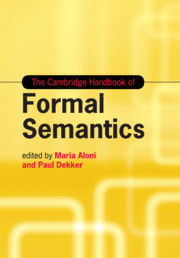Book contents
- Frontmatter
- Contents
- List of figures
- List of tables
- List of contributors
- Preface
- Part I The landscape of formal semantics
- 1 Formal semantics
- 2 Lexical semanics
- 3 Sentential semantics
- 4 Discourse semantics
- 5 Semantics of dialogue
- Part II Theory of reference and quantification
- Part III Temporal and aspectual ontology and other semantic structures
- Part IV Intensionality and force
- Part V The interfaces
- Bibliography
- Index
2 - Lexical semanics
from Part I - The landscape of formal semantics
Published online by Cambridge University Press: 05 July 2016
- Frontmatter
- Contents
- List of figures
- List of tables
- List of contributors
- Preface
- Part I The landscape of formal semantics
- 1 Formal semantics
- 2 Lexical semanics
- 3 Sentential semantics
- 4 Discourse semantics
- 5 Semantics of dialogue
- Part II Theory of reference and quantification
- Part III Temporal and aspectual ontology and other semantic structures
- Part IV Intensionality and force
- Part V The interfaces
- Bibliography
- Index
Summary
Introduction
Lexical semantics is the study of what words mean and how their meanings contribute to the compositional interpretation of natural language utterances. The lexicon can be seen as that component of the grammar that encodes both the information required for composition in the syntax and the knowledge for multiple levels and types of semantic interpretation. Lexical entries are richly structured objects that act as triggers both to compositional operations and to entailments and implicatures in the context of larger discourses. Because any semantic interpretation requires access to knowledge about words, the lexicon of a grammar must provide a systematic and efficient way of encoding the information associated with words in a language.
Four key questions arise when determining how to model the meanings conveyed by words:
(i) What are the semantic components that constitute word meaning?
(ii) How are word meanings differentiated and how are they related to each other?
(iii) How does the meaning of individual words drive the compositional process to make semantically coherent sentences?
(iv) When is a component of word meaning considered “lexical” rather than “world” knowledge?
As the linguistic phenomena associated with lexical semantics become better understood, several theoretical assumptions have emerged across most current models of word meaning. These can be summarized roughly as follows:
• Lexical meaning involves a kind of componential analysis, either through predicative primitives or a system of types.
• The selectional properties of words must be explained in terms of the lexical semantics of predication.
• An understanding of the semantics of nouns and the contribution that verbal arguments play in composition is crucial for an adequate model of how lexical semantics contributes to compositionality.
As we will see below, the first point makes an explicit connection between predicate decomposition theories (such as Lakoff, 1965/1970; Levin and Rappaport-Hovav, 1995) and type-theoretic approaches to lexical semantics (Dowty, 1979; Pustejovsky, 1995; Davis and Koenig, 2000; Asher and Pustejovsky, 2006; Asher, 2011). This in turn directly influences the manner in which selectional constraints are encoded. Finally, we will observe the central role of Aktionsarten and event typing in the determination of sentence meaning in composition.
- Type
- Chapter
- Information
- The Cambridge Handbook of Formal Semantics , pp. 33 - 64Publisher: Cambridge University PressPrint publication year: 2016
- 4
- Cited by



